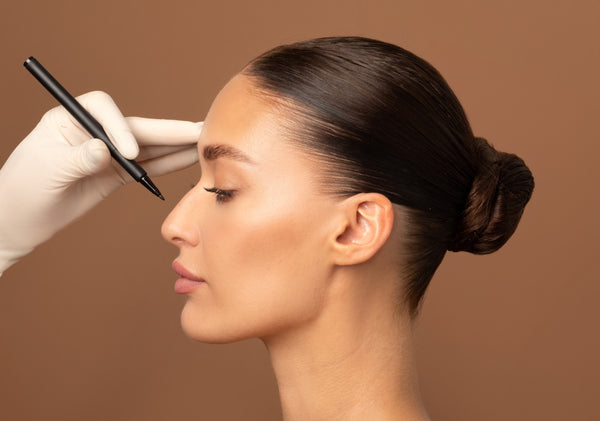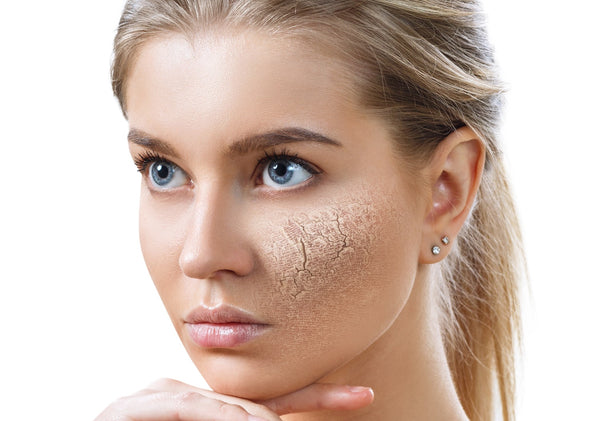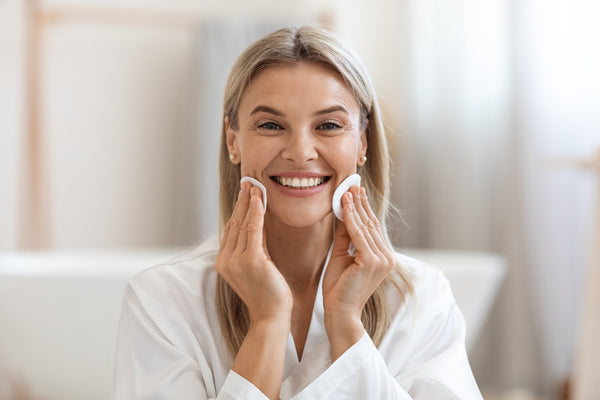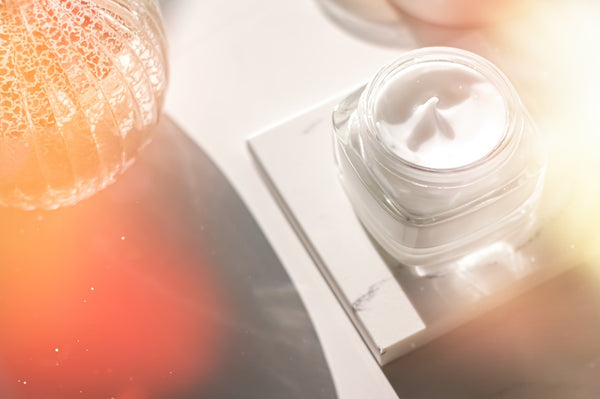Understanding White Spots on Skin: Causes and Treatment

Everything You Need to Know About White Spots on Skin
White spots on dalmatians? Adorable! White spots on skin? That’s another story.
When it comes to our complexion, it’s easy to let those pesky white spots alter our confidence. At MD GLAM, we're all about self-improvement - especially when it comes to the overall appearance of the way our skin looks. But we also understand wanting to feel good in your skin, too.
The good news? We can take steps to minimize our spots and feel like our best selves simultaneously.
Today, we'll be sharing the most vital information about white spots on skin — from their root causes to remedies that'll have you falling in love with your skin all over again.
What are White Spots on Skin?
White spots on skin are patchy, spotted areas of skin that appear lighter than the surrounding skin. These spots can occur on any body part, ranging in size and shape.
As for what causes white spots on skin, it can be a bit of a puzzle. That’s because there are many different factors contributing to their development.
are many different factors contributing to their development.
Finding out why they make their surprise appearance means getting familiar with the different types of white spots that exist.
What Causes White Spots on Skin?
White spots generally appear because skin proteins or dead cells become trapped under the skin’s surface. They also develop due to color loss (or depigmentation).
While understanding the underlying causes of white spots on skin requires a little research, pinpointing which type you’re dealing with is the first step in unraveling their mystery and minimizing their appearance.
To shed some light, let’s run through the most prevalent types of white spots.
White Spots on Skin from Sun Exposure
Ever notice white spots on skin after sun exposure? These are commonly known as sunspots (or guttate hypomelanosis). You usually see them after the redness and irritation of a sunburn subside.
Sunspots are caused by melanin overproduction in response to excess UV radiation. Fortunately, they’re generally harmless and don’t typically come with other symptoms.
Although you can get white spots on skin pretty much anywhere, sunspots typically appear on your face, hands, arms, and areas regularly exposed to sunlight. They measure between 1–3 mm, so they’re relatively small and easy to conceal.
Despite their small size, their visibility can still be unwanted. Fortunately, they aren’t usually a cause for medical concern.
White Spots on Skin from Fungus
Some white spots on skin are caused by a fungal infection known as tinea versicolor or pityriasis versicolor. These develop due to an overgrowth of malassezia, a variety of yeast naturally present on the skin. When this yeast grows out of control, it leads to the appearance of discolored spots on the skin.
White spots from fungal infections typically appear around your chest, back, arms, or neck. They can also be pink, red, or brown and accompanied by dry skin, scaly, or itchy patches. These types of spots tend to grow slowly, often clustering together.
Like sunspots, white spots on skin from fungus aren’t painful or harmful to your health.
White Spots on Skin from a Vitamin Deficiency
Similar to hyperpigmentation, white spots on the skin sometimes appear as a result of nutrient deficiencies, such as:
- Copper
- Niacin (Vitamin B3)
- Vitamin B12
- Vitamin C
- Vitamin D
- Vitamin E
- Zinc
These deficiencies can alter your body’s production of melanin, leading to areas of skin being lighter in color than surrounding areas. They can appear anywhere on the body as patches or scattered spots.
In some cases, simply balancing your nutrient intake does the trick to improve their appearance. In other cases, however, you may need to come up with a more appropriate treatment plan with your doctor.
White Spots on Skin from Hormones
Hormonal changes, like those that occur during puberty, pregnancy, or menopause, can trigger melanin overproduction resulting in the unwelcomed development of white spots on the skin. Itching or redness can also coincide with their appearance.
Your best bet when it comes to navigating hormone-related skin spots? Confide in your dermatologist; they’ll steer you in the right direction.
White Spots on Skin from Autoimmune Diseases and Underlying Conditions
Some white spots on the skin develop due to underlying medical conditions or diseases, such as:
-
Vitiligo: The exact cause of vitiligo isn’t known. However, many experts believe it’s an autoimmune disorder in which the body's immune system attacks and destroys melanocytes (pigment-producing cells). As these cells are destroyed, white patches appear on the skin.
- Idiopathic guttate hypomelanosis (IGH): Known as “reverse freckles,” IGH triggers small, flat white spots called hypopigmented macules, ranging in size from 1 to 5 mm. Like sunspots, they appear in sun-exposed areas.
- Genetics: Genetic conditions, like tuberous sclerosis or Vogt-Koyanagi-Harada syndrome, can trigger the development of white spots on skin. Others are genetically predisposed to developing certain skin conditions, like vitiligo or atopic dermatitis, which can cause white spots.
Ready to say farewell to these bothersome spots and ignite confidence? We’ve got you covered!
3 Tips for How to Get Rid of White Spots on Skin
As we’ve learned, white spots crop up due to many reasons. But don’t fret — there are a few ways to bid them adieu and invite your best skin yet.
- Wear SPF and Protective Clothing
- Medications and Treatments for White Spots on Skin
By now, we all know how crucial minimizing our exposure to UV rays is for slowing down the aging process and keeping our skin happy, healthy, and radiant.
Shielding your complexion is just as important for preventing white spots on skin after sun exposure. So sport that chic, wide-brimmed hat you’ve had tucked away in your closet and lather on the SPF. Our holy grail? Sunshout Sunscreen SPF 50, of course.
Some professional treatments and meds help reduce and even remove white spots on the skin, such as:
- Chemical peel: Uses a chemical solution to encourage new skin cells and reduce white spots.
- Laser therapy: Uses high-energy light to break down skin pigment.
- Cryotherapy: Uses liquid nitrogen to freeze and remove white spots, allowing new skin to grow.
- Microdermabrasion: Uses a device to exfoliate and reduce white spots on skin.
- Topical creams/ointments: Creams containing hydroquinone, tretinoin, or corticosteroids can help reduce white spots.
- Supplements: Can address nutrient deficiencies and potentially improve the appearance of white spots.
- Prescription medications: Some prescription meds (like corticosteroids or immunosuppressants) treat white spots from autoimmune disorders and infections.
- 3. Home Remedies for White Spots on Skin
DIY treatments may not be as effective as professional treatments or medical-grade skincare, but it certainly won’t hurt to try! Plus, taking time for self-care can be a great way to boost your mood and confidence.
Here are popular home remedies for minimizing white spots on skin:
- Aloe vera: Apply fresh aloe vera gel to the area and leave it on for 15-20 minutes before rinsing off.
- Apple cider vinegar (ACV): Dilute ACV with water in a 1:1 ratio and apply with a cotton ball.
- Turmeric: Mix turmeric with water or milk to form a paste and apply to your skin. Let sit for 15-20 minutes before rinsing off.
MD GLAM: Your Spotless Skincare Solution
 Let’s get one thing straight: those pesky white spots on skin can be frustrating, but they do not define you. Your skin is a reflection of who you are, and every little spot and freckle tells a story.
Let’s get one thing straight: those pesky white spots on skin can be frustrating, but they do not define you. Your skin is a reflection of who you are, and every little spot and freckle tells a story.
So embrace every inch of your skin — imperfections and all. And make your story one of self-love and undeniable confidence.
Ready to pen a new chapter of self-empowerment with the help of clinically-proven skincare? Together with MD GLAM, we'll make it a story worth telling!










